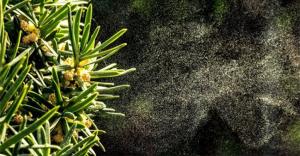For many people, “allergy season” usually falls in the spring, when pollen from trees and flowers is scattered throughout the air.
But why does pollen make you sneeze?
Since humans have coexisted with plants throughout their evolutionary history, you might think that we are more or less “immune” to pollen. However, each year, pollen still causes countless people to sneeze and experience different types of allergies. Read on to find out why!

Pollen helps plants reproduce.
Pollen helps plants reproduce: male plants produce pollen to pollinate female plants. However, for this powder to work, it needs to be transferred from the male plant to the female plant. This transport process is the way that pollen gets into your nose and makes you sneeze.
Every plant, from flowers to trees, and even grasses, produces pollen. However, not all pollens cause allergies. Most plants with colorful flowers rely on insects, such as bees, to carry pollen from one plant to another. Because pollen always sticks to an insect or a tree, it can’t get into your nose and cause an allergic reaction.
However, other plants can use the wind to spread pollen around. This type of pollen is very light, so it can be easily carried by the air. The air you breathe in the spring will be filled with this pollen, because this is the pollination season for plants, making allergic reactions more frequent.
This also explains why you often sneeze a lot when it is windy and dry, because there is a lot of pollen floating in the air at this time. When it rains, the wet pollen won’t be able to fly around and get into your nose.
Why does pollen make you sneeze when you accidentally inhale it?
Inside your nose is mucus. Although it looks… disgusting when it comes out of the nose (like when you sneeze, for example), mucus is very important to health. It acts as a barrier, trapping dirt before it gets into your lungs, and keeping you from getting sick. Pollen is just one of many things trapped by mucus.
However, a pollen allergy causes the nose to become inflamed after the pollen gets in: this is called rhinorrhea . Other things can also cause rhinitis – for example, you get rhinitis every time you catch a cold.
Besides causing you to sneeze, allergic rhinitis also causes a stuffy nose, a runny or itchy nose, and other uncomfortable symptoms.
These symptoms are the result of an immune system response. Your immune system is your body’s defense system . When you have an allergy, your immune system sees something harmless, like pollen, as a threat. So if you have a pollen allergy, your immune system will react to the pollen in your nose thinking it’s a dangerous intruder – even if it’s not actually dangerous.
This overreaction of the immune system causes allergic rhinitis, with all associated symptoms including sneezing. When you sneeze because of a pollen allergy, it’s your body trying to drive dangerous intruders out of your nose.

Pollen allergies will cause the nose to become inflamed after the pollen gets in.
Not everyone is allergic to pollen, and not everyone is allergic to the same pollen. Why?
Scientists aren’t sure the answer to this question – because they still don’t understand why we develop allergies in the first place. After all, these overreactions of the immune system harm us rather than help us, so it doesn’t really make sense for them to spread to everyone.
According to one theory, allergies are the result of the body’s natural defense against parasites, but things don’t go as planned. However, another theory holds that allergies are actually the body’s defense against toxins. In the past, there were probably really dangerous types of pollen, which is probably why many people’s bodies still see them as a threat.
So far, though, we don’t fully understand why allergies exist, or why they’re so widespread. We just know that for some reason some people’s bodies view harmless allergens like pollen as dangerous. The immune system works and does everything it can to get rid of pollen, like making you sneeze and causing a runny nose.
Obviously, the experience of sneezing because of pollen is not very pleasant. But it is proof that the immune system is trying to protect you – a trait that has probably helped humans survive for thousands of years, when our bodies used to face dangerous threats. which has now been forgotten.

